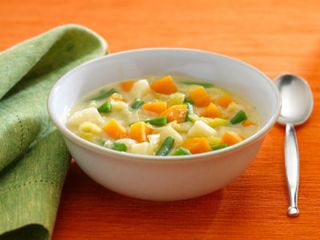Health
The Many Health Benefits of Soup
Vegetable soup, bone broths are packed with nutrients
Posted July 30, 2018

Soups make it easy to boost the veggie intake of even the pickiest toddlers. A vegetable or other food that your baby doesn’t like can be diced into very small pieces or pureed into the soup, which can be key in improving your toddler’s tolerance of different vegetables and other foods. In turn, this will make him more likely to eat a more varied healthy diet as an adult.
In my new book, “What to Feed Your Baby & Toddler,” I share easy recipes for different soups you can make for your toddler, including Broccoli-Potato Chowder with White Cheddar Cheese, Creamy Tomato Rice Soup, Chicken Noodle Egg-Drop Soup with Baby Bok Choy, and Quick Spinach-Potato Soup.
Not only will your little one love these tasty soups, but soup also comes with many health benefits. As some nutrients are better absorbed when a food has been heated, if you put cooked carrots, for instance, in a soup, they yield more absorbable beta carotene for your toddler than when eaten raw. The same can also be said for lycopene, the red pigment responsible for the color of tomatoes. In addition, soup holds onto water-soluble vitamins, so cooking kale, spinach or Swiss chard in a soup rather than steaming them in water increases the amount of the B vitamin folate.
Penn State research involving young children showed that having a large portion of a low-calorie vegetable soup led to fewer calories being eaten at that meal, which can be helpful if your toddler has a large appetite. But for little ones with small appetites, it’s best to keep an eye on their portions so they don’t get too full.
While soups used to be simmered for hours, today there are many prepared broths and soups at the supermarket that you can use as a base to make a soup for your toddler, or you can enjoy these soups straight from the package, can or jar. But keep in mind that these soups can come with a hefty dose of sodium, so make sure you read the label. According to labeling laws, “sodium reduced” means the product contains 25 percent less sodium compared to the original product, but that still might mean too much sodium for your toddler. It’s also important to read the nutrition facts box and compare numbers and serving sizes, as they may vary.

Bone broth is also packed with health benefits for your toddler. Osso Good recently launched new Bone Broth Soup’r Foods, and there are many varieties to try. Consuming bone broth regularly has been linked with improved gut health, strengthened immunity and joint health, since nutrients in the bones contain proteins such as collagen and gelatin. New research continues to suggest that there is a link between our gut microbes and overall health, and bone broth can be useful in naturally healing the gut lining.


